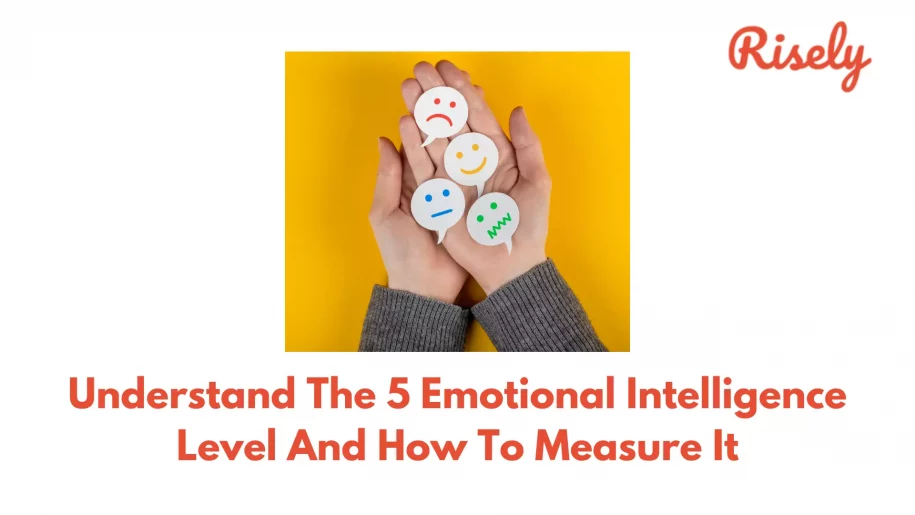Understand The 5 Emotional Intelligence Level And How To Measure It
How well do you understand your emotions and those of others? Ever wondered why some people seem to navigate relationships and leadership roles effortlessly? It might all come down to their emotional intelligence level. How can developing emotional intelligence benefit your personal and professional life? If these questions have piqued your curiosity, you’re in the right place. In this blog, we’ll explore the importance of emotional intelligence level, practical strategies for development, and how you can measure the remarkable impact it can have on your relationships, leadership abilities, and overall well-being. So, whether you’re a team manager aiming to enhance your leadership skills or simply someone interested in personal growth, this blog will provide valuable insights and actionable tips to boost your emotional intelligence level. Let’s exploreWhat is Emotional Intelligence Level?
Emotional intelligence level refers to an individual’s proficiency or skill in understanding, managing, and leveraging emotions effectively. It represents the degree to which someone possesses and demonstrates emotional intelligence in their personal and professional life. Emotional intelligence levels can vary among individuals and can be developed and improved through self-awareness, practice, and learning. It comprises five levels: Self-Awareness, Self-Regulation, Motivation, Empathy, and Social Skills. Measuring EI levels can be done through self-assessment tests or assessments by trained professionals. Improving your EI level could lead to better relationships, communication skills, and overall success in your personal and professional life.Importance of Developing Emotional Intelligence Level
Developing emotional intelligence is paramount in today’s interconnected and fast-paced world. It plays a crucial role in personal and professional success and overall well-being. Emotional intelligence enhances relationships by promoting effective communication, empathy, and understanding. It allows individuals to connect on a deeper level, build trust, and resolve conflicts constructively. Furthermore, emotional intelligence is essential for effective leadership. Leaders with high emotional intelligence inspire and motivate others, understand their team member’s needs, and create a positive work environment, leading to improved team performance and employee engagement. It enhances self-regulation and resilience, leading to better mental and emotional well-being. Moreover, emotional intelligence contributes to better decision-making by considering rationality and emotions. It helps individuals understand and manage their biases, leading to more balanced and thoughtful choices. Lastly, developing emotional intelligence supports personal growth and continuous self-improvement. It fosters self-awareness, identifies areas for development, and cultivates emotional skills that positively impact all aspects of life. Developing emotional intelligence is crucial for building strong relationships, effective leadership, stress management, informed decision-making, personal growth, and overall well-being in our complex and interconnected world.Other Interesting Reads
The Five Levels of Emotional Intelligence
Emotional intelligence (EI) can be complex, but understanding its levels is crucial in developing this skill. Here are five levels of EI that one should aim to master:- Self-Awareness: This involves recognizing and understanding one’s emotions, strengths, weaknesses, values, and triggers. Self-aware individuals are in tune with their emotions and clearly understand how they impact their thoughts and behaviors.
- Self-Regulation: It is the ability to manage and regulate one’s emotions, impulses, and reactions. It involves controlling negative emotions, adapting to change, and composure in challenging situations. Self-regulation allows individuals to respond thoughtfully rather than react impulsively.
- Motivation: Emotional intelligence encompasses intrinsic motivation, which involves setting and working towards meaningful goals. Motivated individuals have a strong drive to achieve, persevere through setbacks, and maintain a positive attitude. They channel their emotions to fuel their determination and persistence.
- Empathy: Empathy is the ability to understand and share the feelings and perspectives of others. It involves actively listening, being attentive to nonverbal cues, and demonstrating compassion. Empathetic individuals can connect with others on an emotional level, fostering understanding and strong interpersonal relationships.
- Social Skills: This component relates to effectively navigating social interactions and building positive relationships. It encompasses communication, teamwork, collaboration, conflict resolution, and leadership skills. Socially skilled individuals are adept at building rapport, resolving conflicts, and inspiring and influencing others.
How to Measure Emotional Intelligence Level?
Measuring emotional intelligence can be challenging as it involves assessing complex and intangible aspects of an individual’s emotional skills. However, there are a few methods and approaches that can provide insights into one’s emotional intelligence:- Self-Assessment: Individuals can use self-reflection and assessment to evaluate their emotional intelligence. This involves honestly examining their own emotions, reactions, and behaviors in different situations. Various self-assessment tools and questionnaires, such as the Emotional Intelligence Appraisal or the Mayer-Salovey-Caruso Emotional Intelligence Test (MSCEIT), can provide a structured framework for self-evaluation.
- 360-Degree Feedback: Gathering feedback from multiple perspectives can offer a more comprehensive view of one’s emotional intelligence. This feedback can be obtained from colleagues, supervisors, direct reports, and others who regularly interact with the person. The feedback can shed light on how one’s emotions and behaviors impact others and provide valuable insights for improvement.
- Behavioral Observations: Observing and analyzing an individual’s behavior and reactions in real-life situations can indicate their emotional intelligence. This can be done through structured observations, performance assessments, or simulations that simulate emotional and social challenges.
- Psychological Assessments: Psychologists and professionals trained in assessing emotional intelligence may administer specialized assessments and tests to measure specific aspects of emotional intelligence. These assessments typically involve a combination of self-report measures, behavioral observations, and situational judgment tests.
Benefits of High Emotional Intelligence Level
- Improved communication and interpersonal relationships.
- Effective conflict resolution and problem-solving.
- Enhanced leadership and team management skills.
- Increased empathy and understanding of others.
- Better stress management and resilience.
- More self-aware decision-making.
- Positive impact on overall well-being and satisfaction.

Techniques for Developing and Improving Emotional Intelligence Level
Here are some techniques for developing and improving emotional intelligence levels:Mindfulness and Meditation
In today’s busy world, finding moments of stillness and tranquility can be challenging. This is where mindfulness and meditation come into play. These practices involve intentionally focusing on the present moment and cultivating a sense of calmness and awareness. Regular mindfulness practice can increase self-awareness, improve focus, and reduce stress. It can also help individuals become more attuned and better equipped to manage their emotions. Meditation, in particular, has been found to boost empathy and compassion for others. With many online resources and local classes available, it’s never been easier to incorporate mindfulness and meditation into your daily routine to improve your emotional intelligence levels.Active Listening and Effective Communication
Practicing active listening and effective communication can improve our emotional intelligence levels by enhancing our ability to understand and empathize with others. This skill can also aid in conflict resolution, enabling us to build stronger relationships with others. These skills can also help us become more effective leaders by allowing us to communicate our ideas clearly and inspire others to act. By improving our communication abilities, we can develop higher emotional intelligence levels and achieve greater success in our personal and professional lives.Empathy and Compassion Practice
Developing empathy and compassion are essential components of improving emotional intelligence levels. Empathy means putting yourself in someone else’s shoes and understanding their perspective, while compassion goes beyond empathy and involves taking action to help others. Practicing empathy and compassion can help you become more attuned to the emotions of others, leading to better relationships with colleagues, friends, and family.Journaling and Reflecting on Emotions
Journaling and reflecting on emotions is an effective technique for developing and improving emotional intelligence. By taking time to write down our thoughts and feelings, we can increase self-awareness and gain a better understanding of our emotional responses. This technique can also help identify patterns in our reactions and provide insights into triggers that may be causing stress or anxiety. Reflecting on emotions can also lead to greater empathy and understanding of other people’s perspectives. It allows us to step back from our own biases and assumptions, which can often cloud our judgment in challenging situations. Regular journaling and reflection help build a strong foundation for emotional intelligence, leading to stronger relationships, better decision-making skills, and improved mental health.Conclusion
Emotional intelligence is the ability to identify, understand and manage your own emotions, as well as recognize and respond to the emotions of others. Developing emotional intelligence can lead to better stress management skills, improved conflict resolution abilities, increased empathy and compassion, better leadership and communication skills, positive interpersonal relationships, higher levels of job performance, and enhanced mental health—five levels of emotional intelligence range from unawareness to emotional mastery. Measuring your emotional intelligence level can be done through self-assessment tests, 360-degree feedback, or performance reviews. Try mindfulness and meditation techniques, active listening and effective communication methods, empathy and compassion practices, or journaling and reflecting on emotions to improve your emotional intelligence level. Sign up for Risely to become an effective manager by guiding yourself and the team to emotional stability and creating a healthy work environment.Hone your critical thinking skills to become an emotionally and practically balanced manager.
Start this journey today with a free critical thinking assessment for managers and leaders.
FAQs
What are the 5 levels of emotional intelligence?
The concept of emotional intelligence is not typically categorized into distinct levels. However, it comprises components like self-awareness, self-regulation, motivation, empathy, and social skills that collectively contribute to one’s emotional intelligence.
What is the highest level of emotional intelligence?
Emotional intelligence does not have a hierarchical or highest level as it encompasses a range of skills and competencies. Therefore, individuals can continue to develop and refine their emotional intelligence throughout their lives.
What are the 4 cores of emotional intelligence?
As Daniel Goleman proposed, the four cores of emotional intelligence are self-awareness, self-management, social awareness, and relationship management. These components encompass various aspects of emotional intelligence skills and abilities.
Other Related Blogs
Handling Emotions at Work Effectively | Reiner Lomb
Handling Emotions at Work Effectively | Reiner Lomb Emotions are what make us human. But that’s also the part we try hard to hide in workplaces. Yet, healthy workplaces do…
Ennui: 7 out of 10 people on your team are bored
Ennui: 7 out of 10 people on your team are bored Over the past weekend, Inside Out 2 became the fastest animated film to cross the $1 billion mark. That’s…
Emotional Intelligence In Communication: 5 Ways Smart Leaders Act
Emotional Intelligence In Communication: 5 Elements Smart Leaders Use Effective communication is the cornerstone of a thriving workplace. It doesn’t matter if you’re speaking to your team members, clients, or…
IQ Vs EQ In The Workplace: How To Use Both Together
IQ Vs EQ In The Workplace: How To Use Both Together? When it comes to being an effective manager, what takes the lead – your head or your heart? For…


